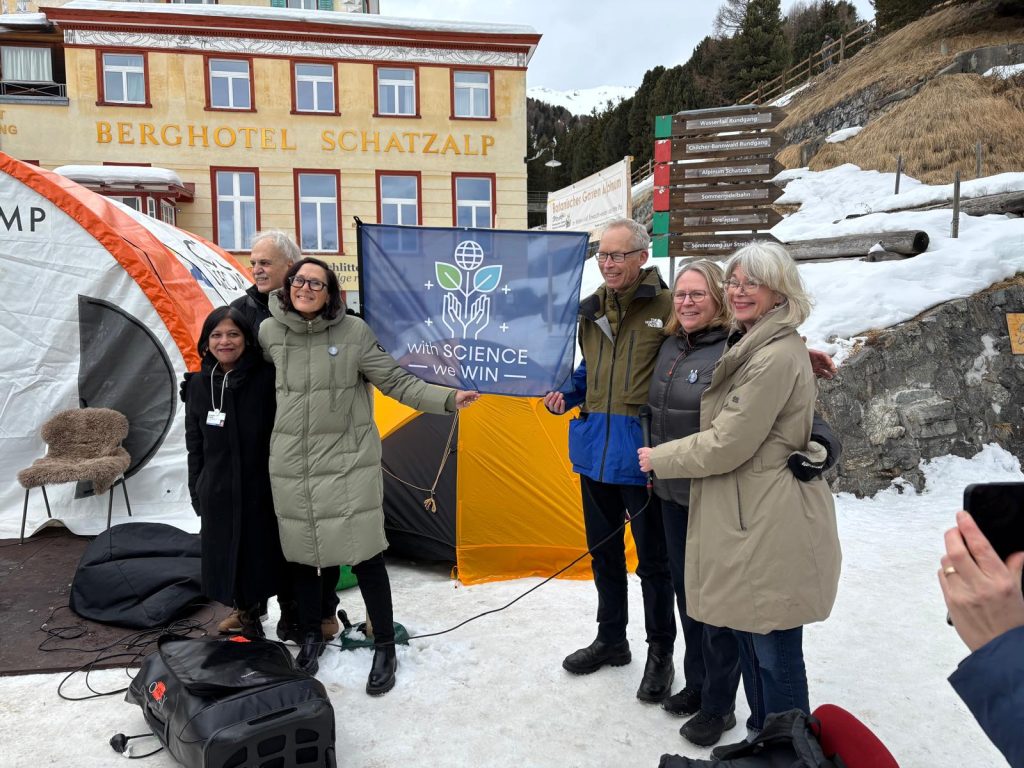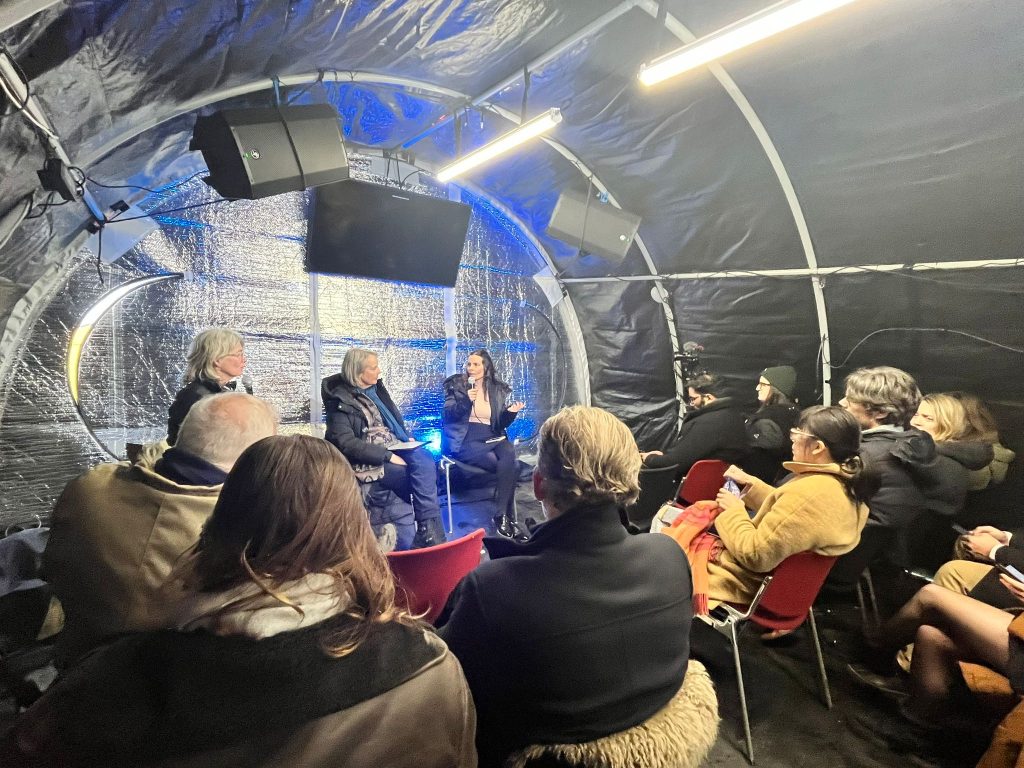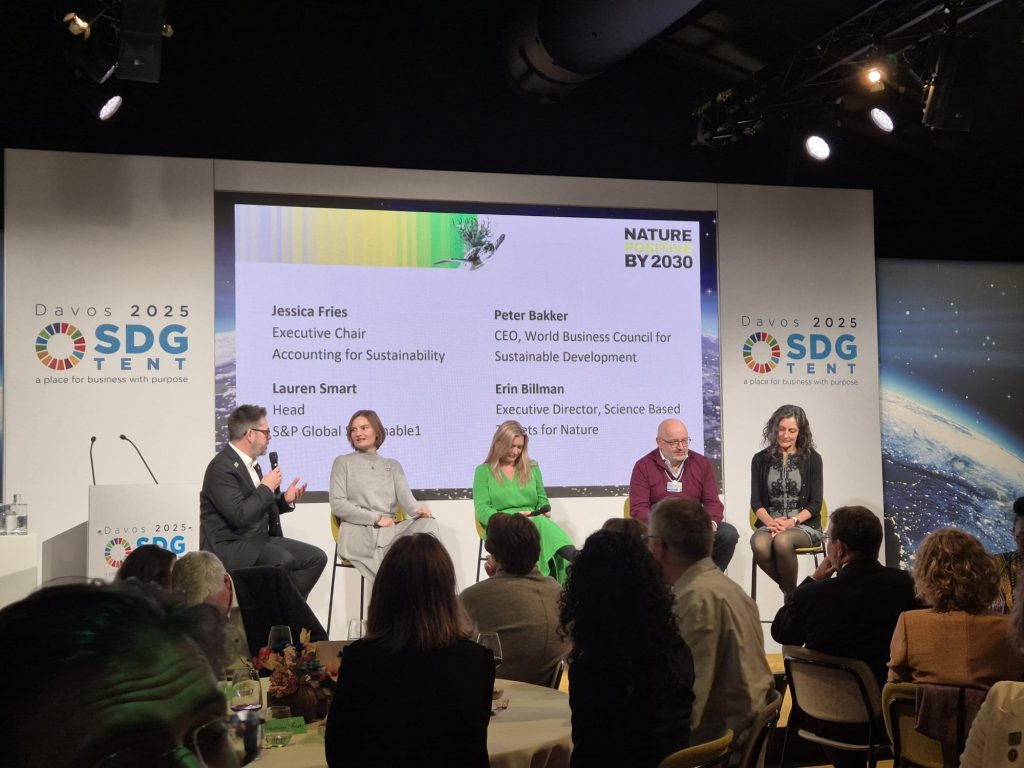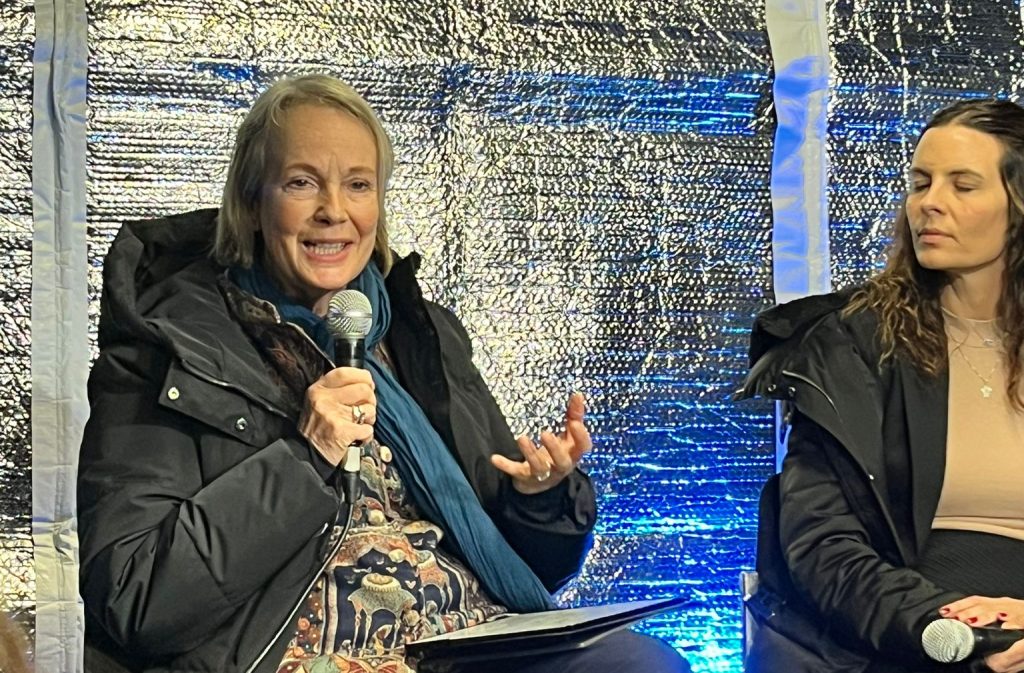This week the Global Commons Alliance Earth Commission, Science Based Targets Network and Accountability Accelerator gathered at the World Economic Forum 2025 in Davos, to collaborate with business, finance, policy and civil society leaders on accelerating just and inclusive systems change to safeguard the global commons.
Amid the world’s escalating climate and environmental crises, we put the spotlight on science’s vital role in shaping global decision-making at the event ‘Science to Action: The Road to Davos 2030’. Organized by Arctic Basecamp with Earth Commission, Future Earth, University of Exeter and Earth4All, the panel discussion explored the planet’s safe and just boundaries, translating scientific insights into action, and making the business case for sustainability.

Speakers at the Science to Action event at WEF 25 stake a science flag in the ground at the Arctic Basecamp in Davos
Earth Commissioner Joyeeta Gupta, a Professor of Environment and Development in the Global South at the University of Amsterdam, explained the Safe and Just Earth System Boundaries: “You need ‘just’ boundaries to ensure that you protect people and you protect nature, long before the ‘safe’ boundaries and tipping elements have been crossed. Just boundaries are more stringent than safe boundaries and so they give you less space in which to operate.”
She said that this science requires richer countries to support the global energy and food transition for all, as “a large portion of the global population does not have access to food, water, energy infrastructure, healthcare, education.” She concluded by affirming that transforming systems within Safe and Just boundaries is crucial “for the survival of our children and grandchildren and for all the other species that share this world with us.”
prosperous opportunity
Johan Rockström, co-chair of the Earth Commission, Director of the Potsdam Institute for Climate Impact Research and Professor in Earth System Science at the University of Potsdam, agreed that science should have a decisive role on the global stage: “Questioning climate science today is like questioning gravity. It’s so overwhelmingly anchored in truth, that the only pathway to the future is to stand on the foundation of science.”
But he warned that the pace of change is underestimated: “If you enter the lab of any climate institution today and really come to the cutting edge of science, you see that warming is going faster than anticipated, tipping points are approaching, earth resilience is declining, carbon budgets are really dwindling down to almost zero. We really are at an emergency point and need to move so fast to have a chance of handing over the planet for the next generations. And it’s our responsibility, as the commitment time within the next 5-10 years [will impact] what will happen over the next century if not millennia.”
He added: “We have so much evidence today that positioning toward a safe operating space of planet earth is the winning path to a more prosperous, healthy, secure and equitable future: why miss that opportunity?”

Speakers at the Science to Action event at Arctic Basecamp in Davos at WEF 25
Wendy Broadgate, Executive Director for the Earth Commission and Global Hub Director at Future Earth, pointed to the exceeded global temperature threshold mapped by scientists for the Paris Agreement which is now causing widespread devastation around the world, and stressed the role of committing to decisions at the highest level in science: “Science is and should be the backbone of decision making. [..] We know we need to have enormous transformations for a stable and resilient planet and stable societies, and science is mapping out the way. Science is here to stay. In Davos we’re here to hold hands with business and decision makers and to inform decisions based on evidence.”
Jane Madgwick, Executive Director, the Global Commons Alliance explained why adopting an Earth systems science base is crucial: “Without this we are “flying blind”, which is increasingly risky for businesses, cities and nation states and leads to greater impacts of increasingly intense disasters. Plus there are unintentional consequences from ill-informed investments. The Safe and Just boundaries in tandem with the Science Based Targets Network’s corporate engagement, tools and methods, provide a framework for action and stepwise approach to increasing resilience for companies and cities. As well as a credible, secure way to move along these pathways with affected communities and in line with increasing government regulations and the growing interest of financial institutes in sustainability for the long-term.”
business value
In the evening, the Global Commons Alliance attended ‘Accelerating Momentum to a Nature Positive Future’, organized by Nature Positive Initiative about inspiring action toward nature positive outcomes and contributions. Erin Billman, Executive Director, Science Based Targets Network, outlined how the leadership of science-based target-setting companies—including Holcim, Kering and GSK—proves that credible, measurable action toward a nature positive future is within reach for all.

Accelerating Momentum to a Nature Positive Future session at the SDG Tent
During the session, Erin Billman said: “We need to get companies to operate within planetary boundaries and the mechanism to do that is science-based targets for nature, primarily. We now have consensus NGO support on how much is enough for a company to do its part. So that’s huge. And with that, we actually had 17 companies that actually used it and progressed through. [..] They’re not committing to do something in the future, they did it. It’s done. They have the first science-based targets for nature, beginning with freshwater and land. From a storytelling perspective this is really powerful because it shows that it’s possible.”
She also highlighted the opportunity for business action to bring wider benefits, as protecting nature is a bipartisan issue: “We can be the great unifier here. Back to the point around narrative, we’ve got the biggest opportunity at hand. This doesn’t have to be polarizing, or a Leftist or progressive point.”

Jane Madgwick, Executive Director, Global Commons Alliance at the Arctic Basecamp in Davos
The Global Commons Alliance was also present and spoke at several other events including on Tuesday, when GCA Accountability Accelerator, Global Reporting Initiative, Porticus and partners organized hosted leaders from over 20 organizations to discuss accelerated action on nature through corporate capacity building on nature standards and frameworks.
Dean Cambridge, Director of Data and Standards at the Accelerator said: “The success of this convening highlights the incredible power of collaboration. By bringing together leaders from across the standards and frameworks ecosystem we are seeking to align our efforts, and accelerate meaningful impact for businesses, communities, and the planet. It’s through these collective conversations that we break down silos, identify shared opportunities, and build the capacity needed to address the urgent challenges we face.”

